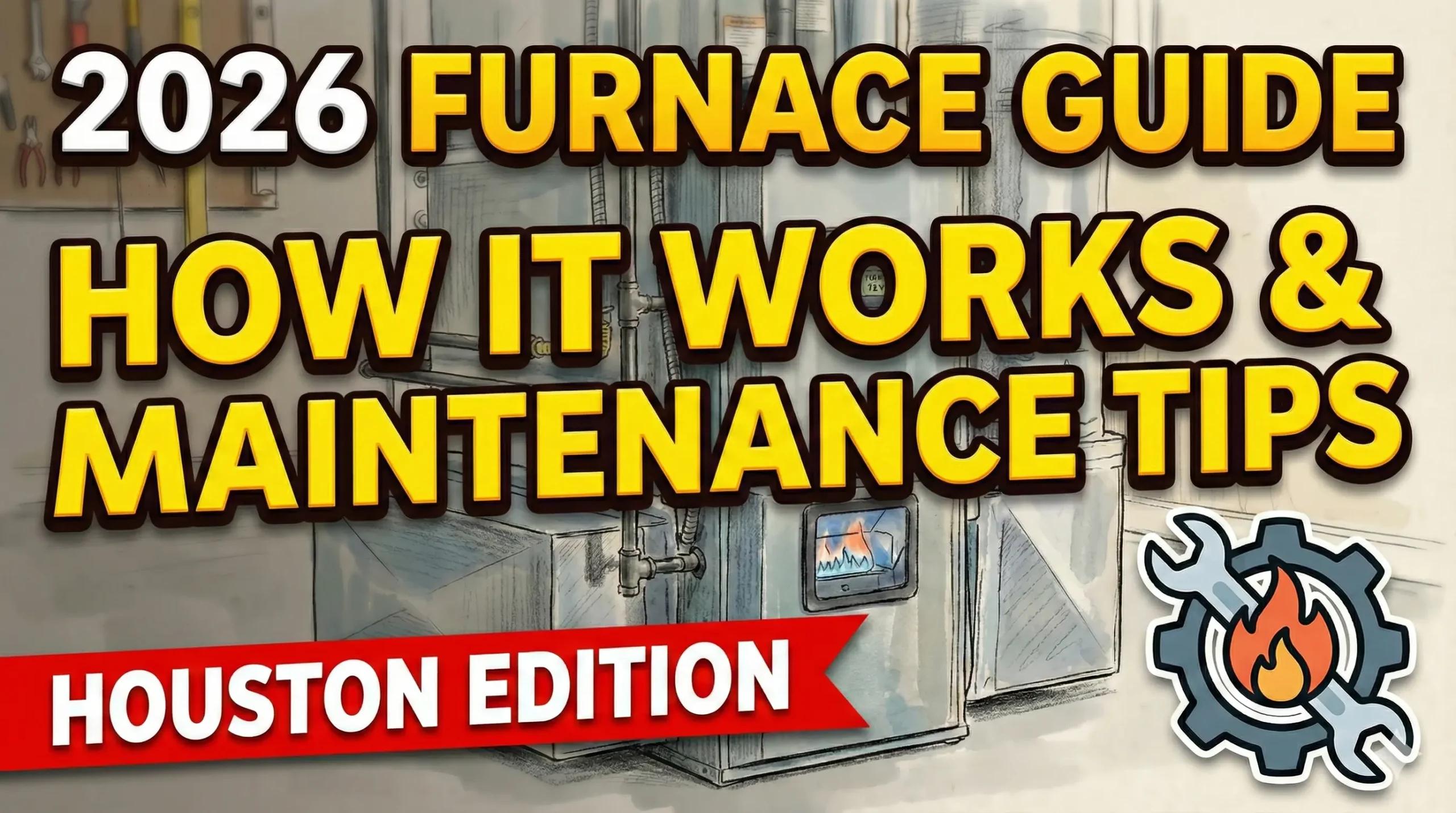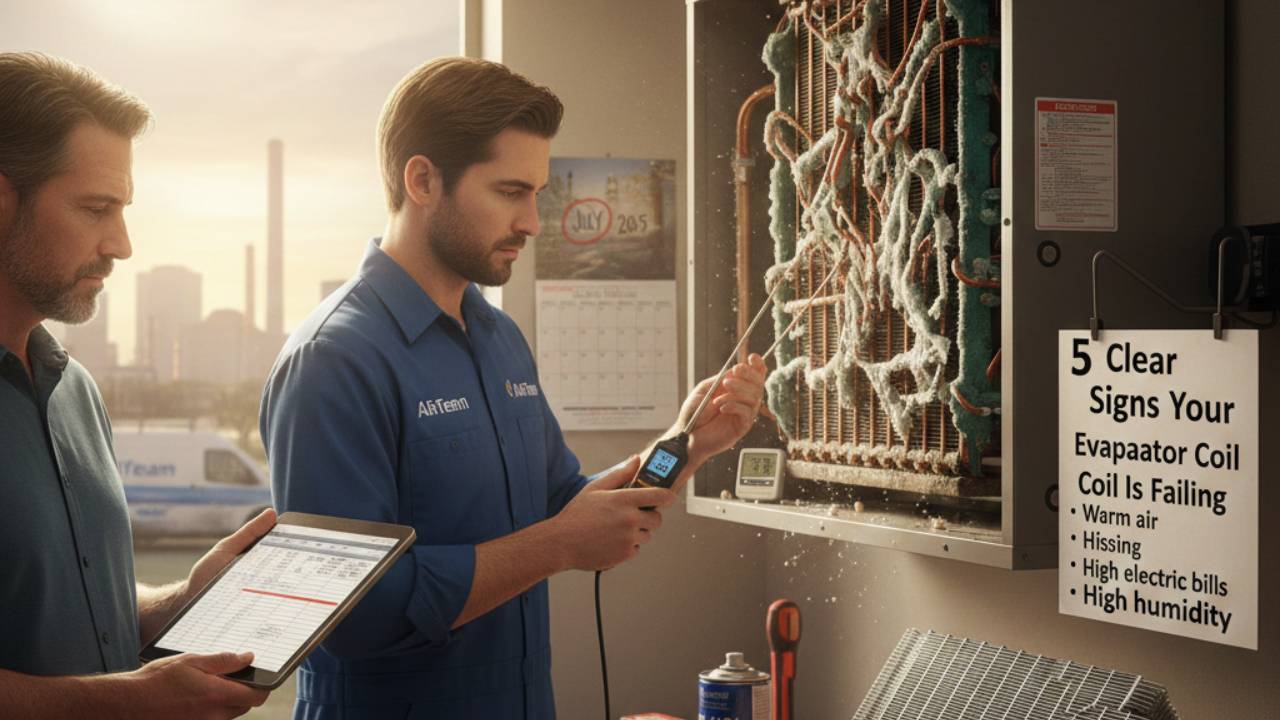A: There’s several reasons why it could be high. It could be an HVAC system that’s underperforming to where the surface of the evaporator coil is not reaching the temperature ideal for removing moisture.
Another could be, that maybe the system installed was oversized. Somebody didn’t run a heat load calculation on the home and installed a larger system than needed. Now, the system is short-cycling and not running enough hours out of the day to both bring the temperature down and have enough time to remove humidity. You’ll get that muggy feeling in the home; you may reach your temperature setpoint but you won’t remove that humidity.
This is a question we get asked at least a dozen times a week and almost every time—the HVAC system is the culprit. It throws people for a loop because their home feels cool, but it’s muggy in the house. Granted, this is Houston, and the humidity is always high here. However, in your air-conditioned home—it shouldn’t be.
Wondering why your home is so humid if your HVAC system is working is reason to be concerned. Not just because it’s a sign of HVAC trouble but because if the humidity is not optimal it leads to other problems.
If the humidity is too high (over 30%-50%), condensation can develop throughout the ductwork and vents. This can lead to mold and mildew build-up which can cause serious health issues.
On the flip side, if your humidity is below 30%-50% your home is a perfect breeding ground for dust mites and wreaks havoc on sinuses.
What’s Making My House So Humid?
Since humidity issues are a serious concern, the first thing you need to do is determine the cause. And like we’ve said 90% of the time, it has to do with the HVAC. People don’t always realize that other than cooling your home, the air conditioner controls air quality too.
This means it controls the humidity in addition to controlling the climate. So just because the house is cool, doesn’t mean the system is working properly. When the humidity in your home is higher than it should be, it gets sticky in there. That’s because your skin isn’t able to evaporate moisture as it should be able to.
Before We Blame The HVAC…
While the chances are high that your air conditioner is the culprit, it’s not always the culprit. There are other possible reasons for high humidity in your home.
- Lack of, or a faulty Vet-a-Hood
- Plumbing leak beneath the home
- Poor ventilation in the bathroom
However, 9 times out of 10 when we visit to assess a humidity issue in a home, it’s connected to the HVAC system.
Why Your HVAC System Might Be The Issue
Houston HVAC systems go through a lot of abuse with our lethally hot summers, and semi-tropical climate—it’s a lot. So, it’s not unusual to see a system that has just been beaten down to the point of malfunctioning.
The precise reason why it’s not dehumidifying may not be so easily known. It could be anything from a faulty sensor to something as simple as not running your unit right. It could also come down to a factor of the age of your system. Speaking of, that brings us to one of our most common reasons your system could be the issue.
It’s Just Too Old
As with all machines such as cars, lawnmowers, freezers, etc., air conditioners get old and just can’t cope anymore. Wear and tear eventually gets the best of your unit and it will fail to do one of several things properly.
- Cool the air
- Heat the air
- Move air
- Remove humidity
Your HVAC system won’t always give you blatant signs of failure such as clanging noises or a burning smell. That usually comes after you ignore the subtle signs such as humidity issues. Wear and tear is unavoidable, but it ruins a system even faster if you don’t maintain it regularly.
Either way, if your system is over 12 years old, you should look at your options— repair it or replace it. If the system has received proper maintenance regularly, it might be repairable. However, if you’ve never had it serviced it could be coming back to bite you.
When a system is well maintained, even when it ages and does break down, you’re more likely able to repair it. However, when parts aren’t lubed, cleaned, or checked on regularly—you’re rolling the dice. So, you have to decide which is going to work best for your budget and situation—repair or replace?
You Don’t Let The AC Run Consistently
While this cause isn’t directly the fault of your AC unit, it is involved. One of the worst things you can do to an air conditioner is not run it consistently. Now, we’re not talking about just putting the fan on high and running it at 65° all day.
What we mean is you’re not using the full power of your thermostat. If you’re turning the AC on when you get hot, then turning it back off a few minutes later—you’re killing it. Let your HVAC run with the thermostat.
It may not sound cost-effective to keep the AC running all the time but trust us it is. Because your AC is also responsible for maintaining humidity levels if you don’t run it—you get humidity. One of the best ways to control humidity in your home is to let that AC run.
Now, it should be noted that many higher-end HVAC systems come with a built-in dehumidifier. These systems you can run on auto because it controls the humidity separately giving you even more efficiency.
Get The Right Sized Unit
When it comes to air conditioning, the size of the system is critical for proper functionality and efficiency. Now, this is Texas, and the saying goes bigger is better—but that’s not always the case, especially with AC units.
You see if you buy a system that is too small to cool your home, it will run constantly and cost a fortune to cool. However, did you know that buying too big of a system causes issues as well? Namely, it can have trouble dehumidifying the home. An oversized system will cool your home too fast so it will “short-cycle.” This means that it turns on and cools so quickly, that it doesn’t even get time to remove humidity because it reached its cooling goal.
Having an improperly sized AC installed is one of the most common mistakes we see homeowners make. Always size an AC unit by hiring qualified HVAC technicians like us. A good technician won’t just sell you for the highest price. They’ll do a heat load calculation on the home and make sure you get the right size, no larger or smaller.
Check Your Ducts
Sometimes the issue isn’t from the unit side of things but from the ductwork. You should always call a licensed HVAC tech once a year to inspect your ductwork. The main source of excess humidity could be because of a break in the ducts.
Buy A Dehumidifier
As we mentioned the newer, high-end AC units often have separate humidity controls to facilitate moisture removal. However, if you’re not in the market for a new air conditioning system, consider adding a dehumidifier. You can add one to your existing system so it will remove excess humidity before passing through ductwork.
We Can Evaluate Your HVAC System
We understand that it’s frustrating having a cool house that’s muggy. So, getting it fixed ASAP is very important. If you want to give us a call and schedule an appointment, we can come evaluate your system. We’ll give you a detailed report of any trouble spots and let you know your options.
Contact us today to schedule a visit!




